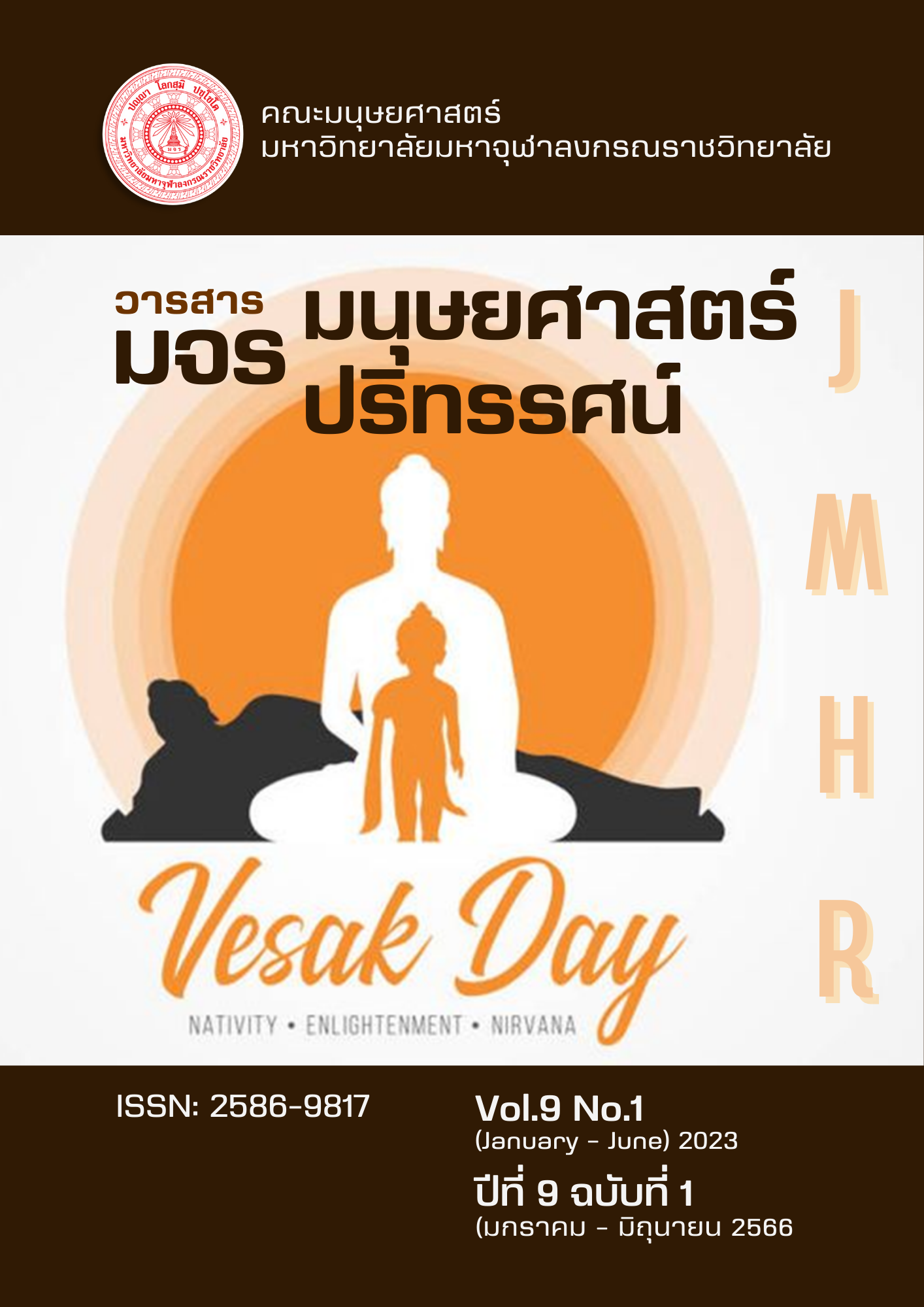สุขภาวะองค์รวมในการทำงานอย่างมีความสุขอย่างยั่งยืนตามแนวพุทธจิตวิทยา
คำสำคัญ:
สุขภาวะองค์รวม, การทำงาน, ความสุข, พุทธจิตวิทยาบทคัดย่อ
บทความนี้ได้ทบทวนวรรณกรรมที่เกี่ยวข้องทั้งจากโลกตะวันตก โลกตะวันออก และจากประสบการณ์ในการทำงานด้านการบริหารและพัฒนาทรัพยากรบุคคลทั้งจากภาครัฐและภาคเอกชน เพื่อให้ทราบว่า ปัจจัยอะไรที่ช่วยส่งเสริมให้เกิดสุขภาวะองค์รวมในการทำงานหรือความสุขในการทำงานข้างต้น พุทธจิตวิทยาสามารถสร้างสุขภาวะองค์รวมได้อย่างไรนั้น เป็นการใช้ทั้งศาสตร์ตะวันตก ที่คำนึงถึงความต้องการของมนุษย์และองค์ประกอบที่สำคัญที่ทำให้เกิดความพึงพอใจในการทำงานและใช้หลักพระพุทธศาสนาที่สำคัญคือ ใช้หลักอิทธิบาท 4 และพรหมวิหาร 4 เพื่อความสำเร็จในการทำงาน รวมทั้ง เพิ่มความสุขในการทำงาน การใช้พุทธจิตวิทยา พิจารณาถึงความต้องการทั้งหมดนี้เพื่อเข้าถึงความรู้สึก และจิตใจของมนุษย์ ซึ่งองค์กรสามารถนำไปปรับใช้เป็นแนวทางในการสร้างความสุขในการทำงาน และบุคลากรสามารถพัฒนาตนเองให้เกิดความสำเร็จในการทำงาน และความสุขที่ยั่งยืนได้ แบบ “งานได้ผล คนเป็นสุข”
เอกสารอ้างอิง
กรมการศาสนา. (2541). ความสำคัญของพระพุทธศาสนาและศาสนาต่าง ๆ. กรุงเทพฯ : โรงพิมพ์การศาสนา.
จิราภร ฤกษ์ชนะ. (2559). แนวทางการสร้างความสุขในการทำงานในองค์กร กรณีศึกษา : บริษัทแห่งหนึ่งในนิคมอุตสาหกรรมมาบตาพุด จังหวัดระยอง (วิทยานิพนธ์ปริญญามหาบัณฑิต). มหาวิทยาลัยบูรพา. ชลบุรี.
ชลธิชา กาญจนศิริ และ พระมหาดาวสยาม วชิรปญฺโญ. (2563). โภชนปฏิบัติ : การใช้หลักโภชเนมัตตัญญุตาในการรักษาโรคตามแนวทางของพระพุทธศาสนาเถรวาท. วารสารบัณฑิตศึกษามหาจุฬาขอนแก่น, 7(3), 63-65.
ดวงเนตร ธรรมกุล. (2555). การสร้างสุขภาวะในองค์กร. วารสารวิจัยทางวิทยาศาสตร์สุขภาพ, 6, 1-10.
พระเทพวัชรบัณฑิต, พระมหาสมบูรณ์ วุฑฺฒิกโร และ นภัทร แก้วนาค. (2564). บรรยายในการสัมมนา หัวข้อ “มองทุกข์ ให้สุขได้” ณ ห้องอริยมรรค มหาวิทยาลัย มหาจุฬาลงกรณราชวิทยาลัย. พระนครศรีอยุธยา. วันที่ 14 มีนาคม พ.ศ. 2564.
พระธรรมปิฏก (ป.อ. ปยุตโต). (2558). พจนานุกรมพุทธศาสตร์ ฉบับประมวลธรรม. กรุงเทพฯ : มูลนิธิธรรมทานกุศลจิต.
พระพรหมคุณาภรณ์ (ป.อ. ปยุตฺโต). (2553). พจนานุกรมพุทธศาสตร์ ฉบับประมวลศัพท์. กรุงเทพฯ : สหธรรมิก.
พระมหาสากล สุภรเมธี. (2558). การดูแลสุขภาพแบบองค์รวมตามแนวพุทธปรัชญา. วารสารมหาวิทยาลัยมหามกุฎราชวิทยาลัย วิทยาเขตร้อยเอ็ด, 4(2), 355-357.
ภัทรดนัย ฉลองบุญ. (2561). ความสุขในการปฏิบัติงานของบุคลากรภาครัฐ. วารสารสันติศึกษาปริทรรศน์, 6(ฉบับพิเศษ), 590-599.
มนัสชนก เมืองเงิน. (2563). รูปแบบการพัฒนาองค์กรประสิทธิภาพสูงตามแนวพุทธจิตวิทยา (ดุษฎีนิพนธ์พุทธศาสตร์ดุษฎีบัณฑิต). มหาวิทยาลัยมหาจุฬาลงกรณราชวิทยาลัย. พระนครศรีอยุธยา.
สุวัฒน์ ธนกรนุวัฒน์. (2562). ผลของการฝึกสติและคิดบวกที่มีต่อสุขภาวะเชิงอัตวิสัยของบุคลากรในโรงพยาบาลชุมชน (ดุษฎีนิพนธ์พุทธศาสตร์ดุษฎีบัณฑิต). มหาวิทยาลัยมหาจุฬาลงกรณราชวิทยาลัย. พระนครศรีอยุธยา.
Bradburn, N. M. (1969). The Structure of Psychological Well-Being. Chicago:IL:Aldine.
Diener, E., & Chan, M. Y. (2019). Happy People Live Longer: Subjective Well-Being contributes to Health and Longevity. Retrieved June 13, 2019, from https://ssrn.com/abstract=1701957
Herzberg, Frederick. (1991). A Harvard Business Review Paperback: Motivation. Massachusetts: Harvard Business School.
Raymond J. Wlodkowski, (1993). Enhancing Adult Motivation to Learn, Jossey-bass publishers. California.
ดาวน์โหลด
เผยแพร่แล้ว
รูปแบบการอ้างอิง
ฉบับ
ประเภทบทความ
หมวดหมู่
สัญญาอนุญาต
ลิขสิทธิ์ (c) 2023 วารสาร มจร มนุษยศาสตร์ปริทรรศน์

อนุญาตภายใต้เงื่อนไข Creative Commons Attribution-NonCommercial-NoDerivatives 4.0 International License.






